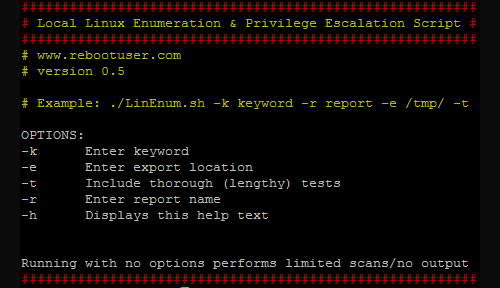LinEnum will automate many Local Linux Enumeration & Privilege Escalation checks documented in this cheat sheet. It’s a very basic shell script that performs over 65 checks, getting anything from kernel information to locating possible escalation points such as potentially useful SUID/GUID files and Sudo/rhost mis-configurations and more.
An additional ‘extra’ feature is that the script will also use a provided keyword to search through *.conf and *.log files. Any matches will be displayed along with the full file path and line number on which the keyword was identified.

After the scan has completed (please be aware that it make take some time) you’ll be presented with (possibly quite extensive) output, to which any key findings will be highlighted in yellow with everything else documented under the relevant headings.
Usage
|
1 |
./LinEnum.sh -k keyword -r report -e /tmp/ -t |
Checks/Tasks Performed
- Kernel and distribution release details
- System Information:
- Hostname
- Networking details:
- Current IP
- Default route details
- DNS server information
- User Information:
- Current user details
- Last logged on users
- List all users including uid/gid information
- List root accounts
- Extracts password policies and hash storage method information
- Checks umask value
- Checks if password hashes are stored in /etc/passwd
- Extract full details for ‘default’ uid’s such as 0, 1000, 1001 etc
- Attempt to read restricted files i.e. /etc/shadow
- List current users history files (i.e .bash_history, .nano_history etc.)
- Basic SSH checks
- Privileged access:
- Determine if /etc/sudoers is accessible
- Determine if the current user has Sudo access without a password
- Are known ‘good’ breakout binaries available via Sudo (i.e. nmap, vim etc.)
- Is root’s home directory accessible
- List permissions for /home/
- Environmental:
- Display current $PATH
- Jobs/Tasks:
- List all cron jobs
- Locate all world-writable cron jobs
- Locate cron jobs owned by other users of the system
- Services:
- List network connections (TCP & UDP)
- List running processes
- Lookup and list process binaries and associated permissions
- List inetd.conf/xined.conf contents and associated binary file permissions
- List init.d binary permissions
- Version Information (of the following):
- Sudo
- MYSQL
- Postgres
- Apache
- Checks user config
- Default/Weak Credentials:
- Checks for default/weak Postgres accounts
- Checks for default/weak MYSQL accounts
- Searches:
- Locate all SUID/GUID files
- Locate all world-writable SUID/GUID files
- Locate all SUID/GUID files owned by root
- Locate ‘interesting’ SUID/GUID files (i.e. nmap, vim etc)
- List all world-writable files
- Find/list all accessible *.plan files and display contents
- Find/list all accessible *.rhosts files and display contents
- Show NFS server details
- Locate *.conf and *.log files containing keyword supplied at script runtime
- List all *.conf files located in /etc
- Locate mail
You can download LinEnum v0.5 here:
Or read more here.
